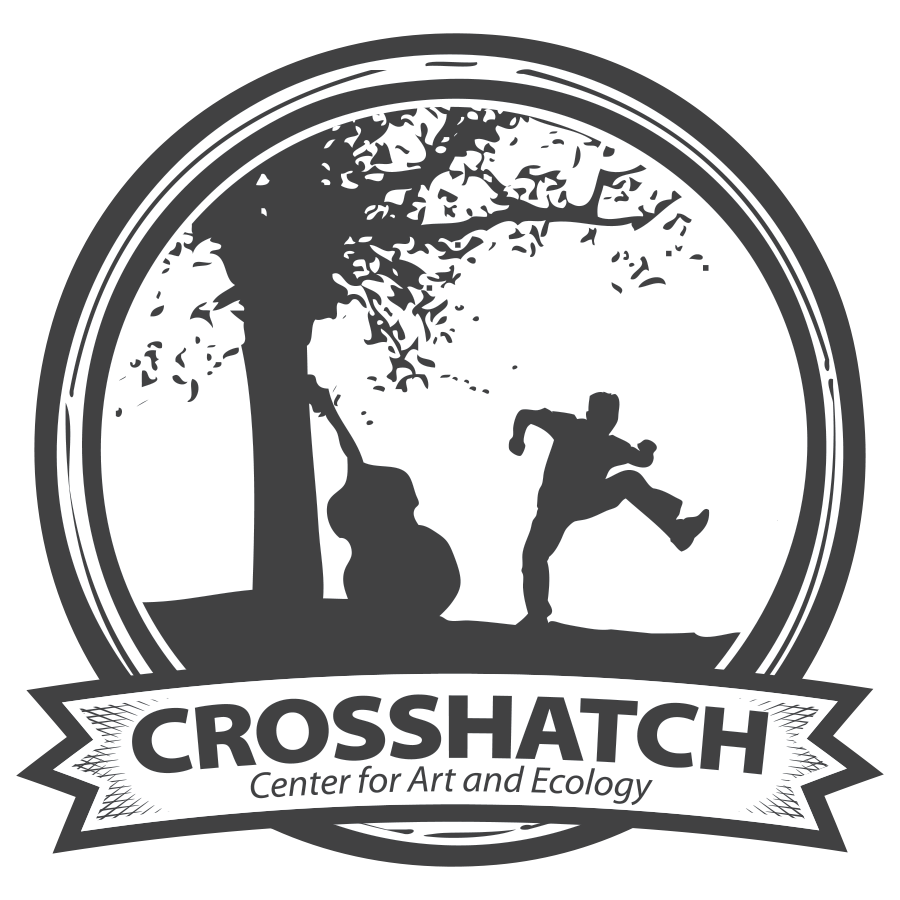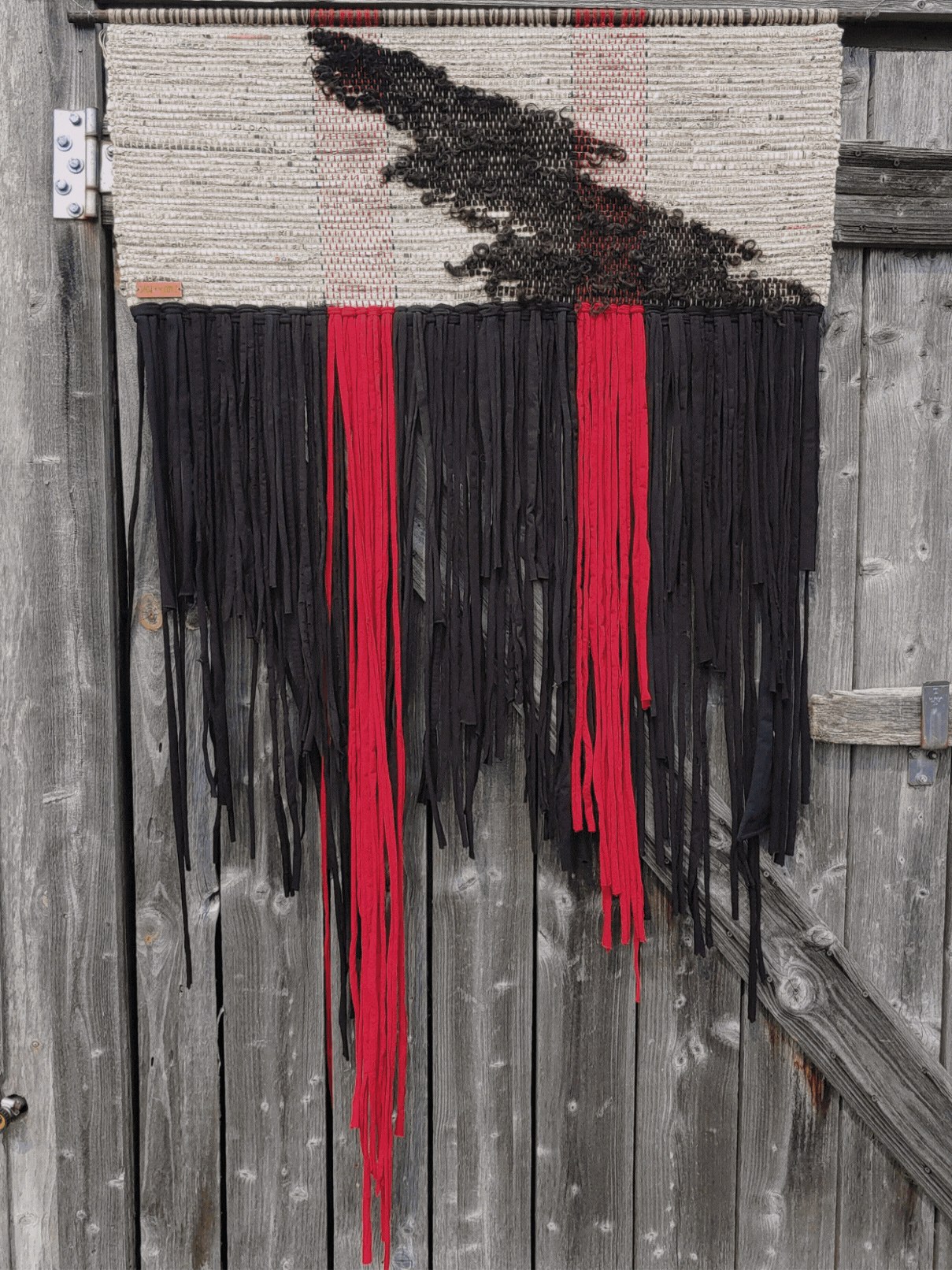Selections from Interlacements (Black and White and Red All Over, Both/And, Silence = Death) • Various Sizes • Jasmine Petrie of Howl at the Loom • 2022/2023
In This Issue: “Messianism as folk culture” and more
Messianism as Folk Culture
by David Benjamin Blower
On the deep memory of land as a form of resistance and resilience
[This essay is adapted from the second episode of the Messianic Folklore Podcast. I've developed the threads here somewhat since I found myself more and more compelled to explore how a soil-and-stars, rooted kind of folk culture lives and moves as a path of messianic resilience, joy and home.]
We are learning to love the roots of the mountains
From which we were birthed and to which we return
We all slowly are making our peace
With deep time layers in the rocks resting
Pierced with drills for our transgressions
by dull machinery of the Roman Peace
Late in the golden age of Caesars,
Princes of privilege on inherited seats
sons of the oil gods, listless
But we are learning to love the deep
The messianic idea is something that has developed over a long time. Before it was fixed upon the coming of some person who would put everything right, it existed in a less specific sense. It existed in the belief that the Creator arights things, and so everything gets balanced out in the end. That's just how it is. It's a law of nature, or of super-nature, perhaps. One day everything would be arighted, and so everything could be understood in the light of this imagined arighting. Whatever was going on, a person could look at it and ask, "well, is that how it'll be when everything is made right?" And the answer might be "I don't think so…" Or it might be, "yes and amen, let's have that all day long!" Of course not everyone agrees about what a world made right would look like. Probably, no two people have quite the same idea. But even so, it provides a kind of frame for thinking about things. It provides a way of seeing imbalances of power in the world.
The anthropologist Vittorio Laternari wrote a book called The Religions of the Oppressed. It explores messianic cults as they emerged among indigenous cultures as they resisted the onset of European colonisation over the course of modernity. Why was messianism the religion of the oppressed? Because it was nearly always the oppressed, the enthralled and the colonised who longed for a shifted future. The colonising rulers of the world didn't want change. They wanted everything just as it was. They didn't want to see the valleys lifted up, or their mountains of power brought low.
Every valley shall be lifted up,
and every mountain and hill be made low;
and all people will see it.
All people are grass,
their constancy is like the flower of the field.
Even the nations are like a drop from a bucket,
Have you not understood from the foundations of the earth?
It is he who sits above the circle of the earth,
and its inhabitants are like grasshoppers;
who stretches out the heavens like a curtain,
and spreads them like a tent to live in;
who brings princes to naught,
and makes the rulers of the earth as nothing.
He gives power to the faint,
and strengthens the powerless.
Those who wait for the Lord shall renew their strength,
These lines are taken from Isaiah 40. This is just the beginning of a long poem. It rolls on for sixteen chapters. It was written to lift the spirits of a migrant community, displaced by war and looking for a way home. It's full of radical messianic energies. There are two things about it that strike me in the light of our present strange moment…
The Warp — Ideas and Inspiration
|| 1 || If the morning snows still have you socked in and coffee hasn’t yet done the trick, consider listening to the essay above to get your mind and heart humming. The production value is a step up from our usual essay recordings, and the accompanying audio carries the words well—giving them a gentle and grounded nudge to roll forth from.
David’s work has been a help to me for years now. His writings, music, questions, and thoughts have played a part in a growth process that’s led to a sense of deeper purpose in small things and community interactions. It’s been constructive. And Crosshatch, as an organization, has pushed for the same: uplifting grounded work and longer views of relationships and community in all their forms. That’s why I wanted to get Messianism as Folk Culture in front of you, Crosshatchian ilk. Thanks, David Benjamin!
|| 2 || This doesn’t mean Brad and I have finished our dialogue. If you’ve been keeping up, you might have picked up on the humor in juxtaposing my essay renouncing back-and-forths (that’s a generalization) and Brad’s essay rekindling our series of back-and-forths (also a generalization.) Setting humor aside, though, Brad answered my question:
“Why is the dialogical (as in dialogue, or back and forth) endeavor of critique, of “calling out,” so vaunted?”
The reason it’s vaunted is because it, when approached in good faith, dismantles our blinders and chips away at disconnect. No single one of us sees the whole, and we depend on others to share how they view things differently. Making time with folks open to those interactions, geared towards construction and commitment to listening and respect, is a form of care. It’s wildly different from only listening “long enough to know that the other person we’re talking to has the same opinion as we do.”
|| 3 || Spaces conducive to these encounters are on the decline. We’ll have more on efforts that are helpful for neighboring and community vitality soon. For now, here’s the trailer for Join or Die. What is Robert Putnam onto, and why does it deserve a broader audience? Join or Die, accepting applications for screenings now, is an attempt to answer those questions and further the reach of his sociological messaging:
loneliness is physically harmful,
connection with other humans is critical,
and work put into civic structures is worth the effort.
|| 4 || Crosshatch, like 90% of non-profits out there, will ask for your support at year-end to help keep this newsletter and our many programs rolling forward and spreading into the cracks. Beat the rush, and give here now.
The Weft — News and Events
We’re heartened by a wide-range of expressions of resilient communities and gatherings. Here’s a smattering of regional events and happenings that reflect that diversity, collected for your consideration. Choose your own adventure!
|| 1 || Commongrounds’ Call for Artists is Now Open: Who? Established and emerging contemporary artists in all mediums. Group exhibitions and curatorial proposals are welcomed, as well as solo exhibition proposals. Applicants are strongly encouraged to submit a cohesive body of work.
Commongrounds is specifically interested in empowering underrepresented artists. We also believe exhibiting a mix of local and national artists contributes to healthy artistic growth and fosters critical dialogue with fresh perspectives for artists and audiences alike. We offer exhibiting artists a stipend based on scope and scale of their body of work. By compensating artists for exhibiting their work, we hope to set a regional standard that values the person behind the art, not just the art itself. Find more details and/or apply here.
|| 2 || Herb Guild meeting!
Thursday December 7th 6 to 8 pm at
Traverse Area District Library—Thirlby Room
610 Woodmere Ave, Traverse City, MI 49686
The topic for this meeting is “Resources”—what better way to connect with our local herbal resources than at the local library. Let's learn about what is available in our community and finish compiling our resource lists. It is the goal of the guild to create resources that are shared with everyone in a living type document that is available digitally.
Do you have a favorite herbal book? Feel free to bring that, or send an email if you are unable to attend to be added to a type of herbal book club.
|| 3 || Savanna Institute’s Perennial Farm Gathering feat. Robin Wall Kimmerer & Ross Gay
December 6 to 8
Virtual Event
Savanna Institute’s signature event of the year, the Perennial Farm Gathering brings together a wide community of farmers, land stewards, and perennial enthusiasts. Over three days, folks gather virtually from across the country and beyond to share our work, research, and lessons learned in panels, workshops, deep dives, and nutshell overviews – all to advance perennial agriculture.
|| 4 || Happenings at The Alluvion Between Now and the Next Whole Field include: Funky Uncle, Mindful + Musical Kids Class with Miriam Pico, Thursday Night Jazz featuring Anthony Stanco, Marion Hayden, and Tariq Gardner, Laurel Premo, Red Tail Ring, Breathe Owl Breathe, The Antivillains, The Don Julio Trio, Big Fun, Rob Smith, The Claudettes, Courtney Kaiser-Sandler, Tim Jones, Yimes, and Steve Leaf.
Find more information at www.thealluvion.org.
|| 5 || The Traverse City Film Festival began anew on October 3rd. The new iteration of the annual festival features a curated film every Tuesday of the year, along with Q/A sessions with filmmakers, $2 popcorn, and more. Find details here.
sponsored by:
Desmond Liggett Wealth Advisors is a mission-driven, fee-only wealth management company with a simple purpose: to generate exceptional value for the individuals, families, small business owners, and non-profit organizations they serve. Desmond Liggett Wealth Advisors believe in and adhere to triple-bottom-line analysis for portfolio investments, ensuring that they review how a company’s environmental and social values impact its long-term resilience and, consequently, value.
Many thanks to the Michigan Arts & Culture Council and the National Endowment for the Arts for their support of this work.
Crosshatch’s The Whole Field is a biweekly (meaning roughly every other week) human-written newsletter. We aim to provide engaging, thought-provoking content that’s worth your time. If you’ve been forwarded this email and want to receive future editions, click here to subscribe to our mailing list or view past newsletters.
We also envision this best as a collaborative work. If you have any suggestions, leads, questions or feedback, we appreciate your reply directly to this email.
Copyright (C) 2023 Crosshatch. All rights reserved.









